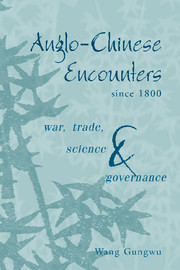2 - “To fight”
Published online by Cambridge University Press: 22 September 2009
Summary
Let me start with one of Arthur Waley's words, “to fight”. The British opening of China in the 1840s was the result of their success in breaking through Chinese naval and coastal defences and the trauma of that defeat for Chinese leaders lasted for generations. It became the most important marker for Chinese historiography when this “Opium War” was chosen, soon after the fall of the Qing dynasty in 1911, to date the beginnings of China's modern history. That decision reflects both a new reality and China's strong desire not to forget the aftermath of regret, resentment and recrimination. The subject has filled hundreds of volumes in a number of languages. The actual fighting has also been fully described many times and the details need not detain us. It is enough to focus here on some of the consequences for China.
The British had coquered much territory in India but did not try to do the same in China. They had fought the Indians for far longer a period, at least 100 years from the Battle of Plassey to the Mutiny, and thereafter against local insurrections and the enemies who threatened the Northwest Frontier. But they did not have to fight long with the Chinese, mainly from 1840 to 1860, because they started fighting the Chinese only after they had already become the strongest power in the world and the Chinese empire was in decline. The British soon had all that they wanted.
- Type
- Chapter
- Information
- Anglo-Chinese Encounters since 1800War, Trade, Science and Governance, pp. 13 - 42Publisher: Cambridge University PressPrint publication year: 2003



